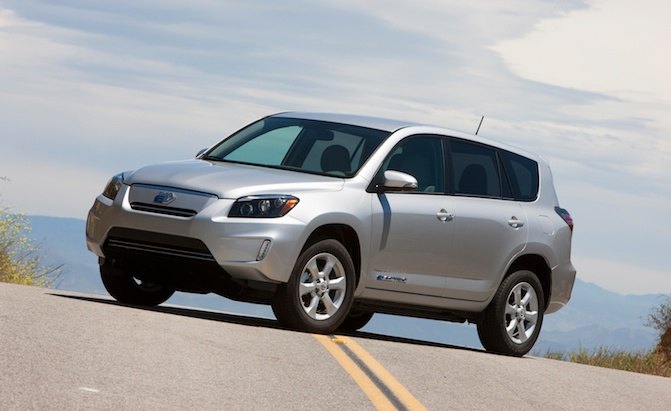Toyota sells a ton of electrified vehicles between its various Prius model variants, the hydrogen fuel cell powered Mirai and other hybrids, but it doesn’t currently sell a fully electric vehicle.
The Japanese automaker is famously cautious and calculated, so it’s not completely a surprise that it hasn’t taken a chance on a battery electric vehicle yet.
Still, it is a bit curious that an automaker so interested in electrification is seemingly silent on the topic of pure EVs when all other automakers are going mad over pure electric offerings.
SEE ALSO: Toyota Wants to Add TRD and AWD Models Across the Lineup
According to Jack Hollis, the general manager of Toyota Motor North America, Toyota dealers just simply don’t think they can sell enough pure electric vehicles to warrant a business case.
“If our dealers, and we just met with our national dealer council two weeks ago, if our dealers felt like there was a significant demand (for EVs) we would have already had fully electric and electric vehicles already on the road today,” Hollis told media in a roundtable interview at the 2018 LA Auto Show.
Toyota fans may remember the RAV4 EV. The electric crossover was first introduced in 1997 and featured a 67 hp electric motor, along with an estimated driving range of around 95 miles. Toyota put it out of production in 2003 before reintroducing a second model in 2012, which only last a couple years before Toyota pulled the plug once again. So it’s not that Toyota doesn’t know how to put EV tech into production, it just doesn’t think it can make any money doing so right now.
“Having that technology, which you’ll remember if you go back the electric RAV4 was one of the first electric offerings in the marketplace in the US, period,” Hollis said. “So the technology there and what we can offer is available, but like any good demand and supply economy, if the demand is low, do you really want to supply?”  Hollis has another gripe with selling EVs. The US government is subsidizing EV sales, and Hollis says it’s hard for a company like Toyota to put a significant push on EVs with the presence of an artificial demand element. Electric vehicle sales have stayed at around 1% of overall vehicle sales in the US even with the current tax credits in place, he pointed out.
Hollis has another gripe with selling EVs. The US government is subsidizing EV sales, and Hollis says it’s hard for a company like Toyota to put a significant push on EVs with the presence of an artificial demand element. Electric vehicle sales have stayed at around 1% of overall vehicle sales in the US even with the current tax credits in place, he pointed out.
This doesn’t mean Toyota is sitting by idly while other automakers invest in EVs. The automaker is taking a cautious approach to electrification, offering hybrids and plug-ins and playing the long game to see if consumers begin to adopt EVs en masse, or if its bet on hydrogen fuel cell tech will pay off. And make no mistake about it, Toyota will offer an EV one day – it’s just hard to say how soon that will be when its dealers aren’t asking for it.
“But I will say at the exact same time, there is daily investment going into fuel cell technology, BEV technology, plug-in technology and hybrid technology,” Hollis said. “And all four are part of our electrification strategy, so I do not believe that our dealers, and they would agree, that we should not go down just with an electric offering but we should with an electrification offering where we have a wider range of products, a wide range of energy sources and uses available. And that’s really what were pursuing, a wider range. And then as we go over time well be able to see where the marketplace moves. But at this point, there is no reason to race that to market.”

It’s an interesting position and definitely different than the strategies of other automakers, especially VW, which is looking to introduce many more EVs going forward and bring them to market as soon as possible. The way Hollis describes it, Toyota has its guns loaded with regards to all forms of electrification, from fuel cell to EVs – but they’ll only pull the trigger on BEVs when the dealers start asking for it.
From AutoGuide.com

